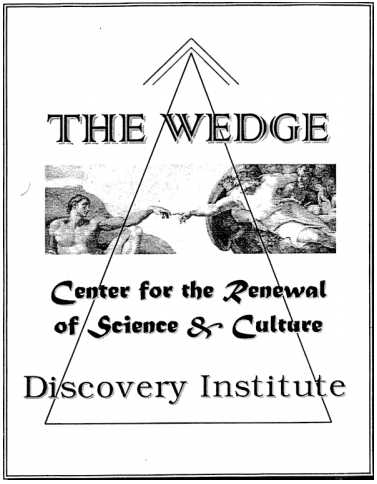On February 5, 1999, the “not for distribution” Wedge Document was first uploaded online for the world to see. The document, produced by the Discovery Institute, explained the “master plan” of the Intelligent Design movement:

Here, for example, were their five year goals:
To see intelligent design theory as an accepted alternative in the sciences and scientific research being done from the perspective of design theory.
To see the beginning of the influence of design theory in spheres other than natural science.
To see major new debates in education, life issues, legal and personal responsibility pushed to the front of the national agenda.
In twenty years, they wanted to see Intelligent Design as the “dominant perspective in science.”
Funny thing about that… The dominant perspectives in science usually involve actual science. Twenty years later, we can safely say their plan failed.
Still, the 1999 document said they would accomplish this, in part, by publishing research in credible journals (ha!); publicizing that research through outlets like television, books, and newspaper op-eds; and injecting ID into public school curriculums (suing districts if necessary).
It’s easy to underestimate the impact the document had — Google was still in its infancy and the blogosphere didn’t have the reach it does now. But the document still found its way into the hands of science advocates across the country.
While the Discovery Institute achieved some level of success (we’re still talking about ID and Creationism, after all, albeit not in any actual scientific way), their plans all came to a screeching halt in 2005, when a judge ruled in Kitzmiller v. Dover Area School District that “the overwhelming evidence at trial established that ID is a religious view, a mere relabeling of creationism, and not a scientific theory.” While the ruling technically applied only to Pennsylvania, the reverberations were felt in many other states, where ID-proponents could see the writing on the wall.
Since then, the Discovery Institute itself has become something of a non-entity. They keep trying to reclaim their glory, but the courts have generally remained on the side of real science. There are always districts and states that manage to water down science curriculums (Hi, Texas) but those fights don’t seem to be lasting as long anymore. The more recent battles involve carefully worded pieces of legislation that would force educators to teach various “controversies” and “strengths and weaknesses” related to established scientific hypotheses. Other bills would prohibit teachers from even bringing up evolution (or climate change) because some political parties mention the topic specifically in their platforms.
Josh Rosenau, writing for the National Center for Science Education in 2014, said that the proponents of the Wedge Document failed on their own terms:
… the Wedge document opened by insisting that “Without solid scholarship, research and argument, the project would be just another attempt to indoctrinate instead of persuade.” By their own standard, the ID creationists have to be judged as engaged in “just another attempt to indoctrinate instead of persuade.”
…
… “Design theory” doesn’t exist, and isn’t a dominant view at any university, nor is it relevant in social science research (except for sociologists interested in why people deny science). Nor do any lawyers seem interested in ID creationism, except for civil liberties lawyers.
Once the playbook was exposed, scientists’ suspicions were shown to be true: ID was just Creationism wrapped with new branding. Its advocates wanted to increase the popularity of ID through media, not scientific journals. They explicitly talked about how they needed Christians on their side, suggesting that faith mattered far more for the success of ID than the evidence did.
No wonder it didn’t get anywhere. Quality science education is still something we need to fight for, but despite the best efforts of people like Ken Ham and Republicans who sit on science committees, the goal isn’t nearly as distant as it used to be.
(Featured image via Shutterstock. This article has been revised and updated since we last posted it.)



It’s Moving Day for the Friendly ..."
It’s Moving Day for the Friendly ..."
It’s Moving Day for the Friendly ..."
It’s Moving Day for the Friendly ..."